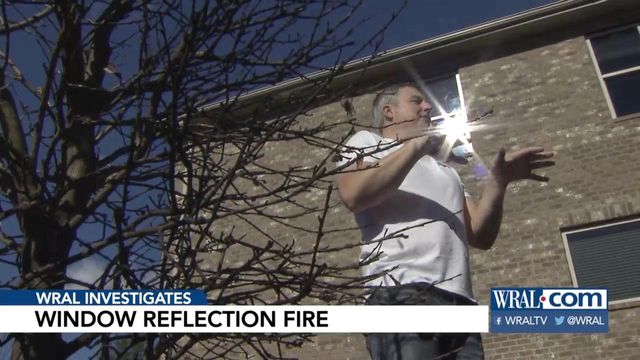Energy-efficient windows blamed for starting fires
Energy-efficient windows are sometimes required any time new ones are installed on homes, but some homeowners say the new windows are starting fires.
Posted — UpdatedMonda’s security cameras filmed the yard smoking at first, then the flames appeared. The fire raced across her yard and surrounded a propane tank.
A nearby landscaping crew tried to trample the flames that surrounded the tank, but it was at least 20 minutes until professional help arrived to extinguish the fire.
Two days later, another fire started in the same spot.
Investigators came back and poked around the property. This time, though, one of them felt a clue: sunlight reflecting off a neighbor’s brand new, energy-efficient window.
The firefighter’s report describes the reflection as so intense that a person couldn’t hold his hand in the light for more than 30 seconds before it felt like it was burning.
The fire reignited two more times that week, four total in one week at Monda’s home!
The energy-efficient windows have been required for years in all new construction projects. After a 5 On Your Side investigation, state building codes were amended to allow builders to swap out problematic windows.
North Carolina Insurance Commissioner and Fire Marshal Mike Causey said he worries about the safety of the windows in light of the fires, but it’s too early to know the best solution.
“We're concerned from a fire safety standpoint, but there's just a lot of variables that—a lot of questions we need to have answers before we could make recommendations,” Causey said. “We'd certainly like to look into it further and get more information.”
Causey questioned whether the building and glass industry could make changes to prevent the dangerous rays. The immediate fix: changing out the glass as the updated building code allows.
Causey says his office wants to hear from homeowners about any fires.
WRAL Investigates also took the concerns to the Window and Door Manufacturers Association. Spokesman Jeff Inks said he does not know of any research or studies that are being conducted about the fire threat from solar reflection on low-e windows.
Concerned about her neighbor’s window, Monda had that propane tank removed, cleared out the pine straw and now has an admittedly bizarre, but what she calls necessary, daily routine.
"I come out and hose this down and then I start laying my mirrors” in an effort to reflect the beam that comes off the window. “Not very sightly, but I'm desperate at this point," Monda said.
Homeowner Patrick Heinzelman had to call the fire department in November to put out a fire that destroyed a bush and some of the surrounding landscape. The next day, the same area caught fire again despite the ground being wet.
"The mulch, which has been watered down with a hose all night long, had the flame retardant powder from fire extinguishers, and with the fire department put their own stuff down, it was still catching back on fire," Heinzelman said.
Since Heinzelman has lived in the new home less than a year, he wanted answers.
"I'm like, that was crazy, we had no idea how that happened, and as we're standing here we could actually feel the heat from the beam," Heinzelman said.
He said he never dreamed a window could be capable of starting a fire.
Heinzelman spent $800 to tint the window, but the reflection continues, and he fears for his family.
"I went out and bought for every room one of these insta-sprays or fire extinguishers," Heinzelman said. "I had a couple in the house, but now every room has it just in case." He also bought a fire escape ladder.
Heizelman's builder initially told him the problem was not covered by his home warranty. After WRAL Investigates got involved, the builder eventually agreed to add a solar screen to refract the sunlight.
"Had I not been home, this would have been a tremendous fire going back into the woods," he said.
For Nancy Monda, she didn't get anywhere with her neighbor until WRAL’s Monica Laliberte reached out to him. He now says he'll replace the window in question.
Heinzelman and Monda found solutions to their specific problems, but they both see this as a much bigger issue.
“If this was a car, a baby blanket anything like that that caught on fire there'd be a recall, " Monda said. "Melting vinyl and melting car parts is one thing, but when you are starting fires … somebody truly needs to do something about this."
A spokeswoman for the Consumer Product Safety Commission said even though there's a risk of fire and consumer danger from the windows, it is a building code issue, not an issue for CPSC.
• Credits
Copyright 2024 All Consumer Reports material Copyright 2017 Consumer Reports, Inc. ALL RIGHTS RESERVED. Consumer Reports is a not-for-profit organization which accepts no advertising. It has no commercial relationship with any advertiser or sponsor on this site. For more information visit consumer.org (http://consumer.org/)






